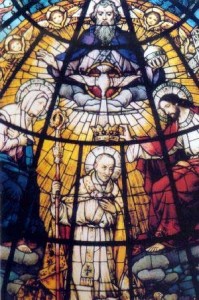Podcast: Play in new window | Download (Duration: 33:20 — 23.0MB) | Embed
Subscribe: Apple Podcasts | Spotify | Amazon Music | Android | Pandora | iHeartRadio | JioSaavn | Podchaser | Gaana | Podcast Index | Email | TuneIn | Deezer | Anghami | RSS | More

Letter 269 – The Letters of St. Elizabeth of the Trinity – Beginning to Pray with Dr. Anthony Lilles
Dr. Anthony Lilles and Kris McGregor discuss a poignant letter written by St. Elizabeth of the Trinity to her sister, during a period when Elizabeth knew her death was near. Elizabeth, suffering from Addison’s disease, had hoped to die on Good Friday in imitation of Christ, but instead experienced a temporary healing that allowed her to continue her spiritual work. This period saw the creation of her most significant writings.
Elizabeth’s letter reflects deep spiritual insights and her acceptance of God’s will. She shares a profound vision of the Holy Trinity, describing how each Person of the Trinity interacts with and transforms the soul. The Father protects and empowers, the Son imprints divine beauty, and the Holy Spirit creates a musical harmony within the soul. She speaks of a unity of love that transcends earthly life, expressing a desire to be her sister’s angel after death and to continue their spiritual bond. This reflects the Catholic doctrine of the communion of saints, where those who have passed continue to intercede and care for the living.
Discerning Hearts Reflection Questions
- Understanding the Trinity’s Role in Our Lives: How does Elizabeth of the Trinity’s description of each Person of the Holy Trinity deepen your understanding of their role in your spiritual life?
- Surrender and Trust: In what ways can you cultivate a deeper surrender to God’s will, as Elizabeth did, especially in times of suffering and uncertainty?
- Communion of Saints: How does Elizabeth’s view of the communion of saints inspire you to think differently about your connection with loved ones who have passed away?
- Power of Silence and Prayer: What steps can you take to incorporate more silence and prayer into your daily routine to better experience God’s presence?
- Experiencing God’s Love: Reflect on a time when you felt the overshadowing protection or empowering love of God, as described by Elizabeth, and how did it transform your perspective?
- Unity and Love: How can you foster a greater sense of unity and love within your family or community, inspired by Elizabeth’s devotion to her sister and her vision of love within the Trinity?
- Devotion to the Holy Trinity: What practical ways can you adopt Elizabeth’s devotion to the Holy Trinity in your personal spiritual practices?
- Impact of Suffering: How can Elizabeth’s acceptance and understanding of her suffering help you reframe your own experiences of pain and hardship in light of God’s plan?

L 269
To her sister
[a toward the end of April 1906]“Having loved those who were His own in the world,
He loved them to the end.”Darling little sister,
I don’t know if the hour has come to pass from this world to my Father, for I am much better and the little saint of Beaune seems to want to cure me. But, you see, at times it seems to me that the Divine Eagle wants to swoop down on His little prey and carry her off to where He is: into dazzling light! You have always put your Sabeth’s happiness before your own, and I am sure that if I fly away, you will rejoice over my first meeting with Divine Beauty. When the veil is lifted, how happy I will be to disappear into the secret of His Face, and that is where I will spend my eternity, in the bosom of the Trinity that was already my dwelling place here below. Just think, my Guite! to contemplate in His light the splendors of the Divine Being, to search into all the depths of His mystery, to become one with Him whom we love, to sing unceasingly of His glory and His love, to be like Him because we see Him as He is! . . .
Little sister, I would be happy to go up above to be your Angel. How jealous I would be for the beauty of your soul that I have loved so much already here on earth! I leave you my devotion for the Three, to “Love.” Live within with Them in the heaven of your soul; the Father will overshadow you, placing something like a cloud between you and the things of this earth to keep you all His, He will communicate His power to you so you can love Him with a love as strong as death; the Word will imprint in your soul, as in a crystal, the image of His own beauty, so you may be pure with His purity, luminous with His light; the Holy Spirit will transform you into a mysterious lyre, which, in silence, beneath His divine touch, will produce a magnificent canticle to Love; then you will be “the praise of His glory” I dreamed of being on earth. You will take my place; I will be “Laudem Gloriae” before the throne of the Lamb, and you, “Laudem Gloriae” in the center of your soul; we will always be united, little sister. Always believe in Love. If you have to suffer, think that you are even more loved, and always sing in thanksgiving. He is so jealous for the beauty of your soul. . . . That is all He has in view. Teach the little ones to live in the sight of the Master. I would love for Sabeth to have my devotion to the Three. I will be at their first Communions, I will help you prepare them. Pray for me; I have offended my Master more than you think; but above all thank Him; say a Gloria every day. Forgive me for having often given you a bad example.
A Dieu, little sister, how I love you. . . . Perhaps I will go soon to be lost in the Furnace of love; whether in Heaven or on earth, we must live in Love to glorify Love!
Catez, Elizabeth of the Trinity. The Complete Works of Elizabeth of the Trinity volume 2: Letters from Carmel (pp. 264-265). ICS Publications. Kindle Edition.
We would like to thank Miriam Gutierrez for providing “the voice” of St. Elizabeth for this series
For other episodes in the series visit the Discerning Hearts page for Dr. Anthony Lilles
Anthony Lilles, S.T.D., has served the Church and assisted in the formation of clergy and seminarians since 1994. Before coming to St. Patrick’s, he served at seminaries and houses of formation in the Archdiocese of Denver and the Archdiocese of Los Angeles. The son of a California farmer, married with young adult children, holds a B.A. in theology from the Franciscan University of Steubenville with both the ecclesiastical licentiate and doctorate in spiritual theology from the Pontifical University of Saint Thomas Aquinas in Rome (the Angelicum). An expert in the writings of St. Elizabeth of the Trinity and the Carmelite Doctors of the Church, he co-founded the Avila Institute for Spiritual Formation and the High Calling Program for priestly vocations. He also founded the John Paul II Center for Contemplative Culture, which hosts symposiums, retreats, and conferences. In addition to his publications, he blogs at www.beginningtopray.com .

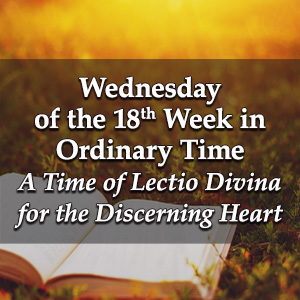 Wednesday of the Eighteenth Week in Ordinary Time – A Time of Lectio Divina for the Discerning Heart Podcast
Wednesday of the Eighteenth Week in Ordinary Time – A Time of Lectio Divina for the Discerning Heart Podcast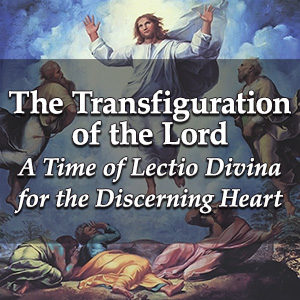 The Transfiguration of the Lord – A Time of Lectio Divina for the Discerning Heart Podcast
The Transfiguration of the Lord – A Time of Lectio Divina for the Discerning Heart Podcast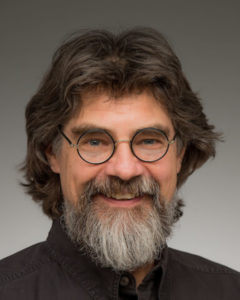







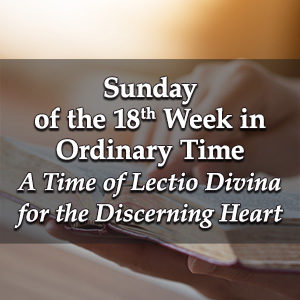 Sunday of the Eighteenth Week in Ordinary Time – A Time of Lectio Divina for the Discerning Heart Podcast
Sunday of the Eighteenth Week in Ordinary Time – A Time of Lectio Divina for the Discerning Heart Podcast